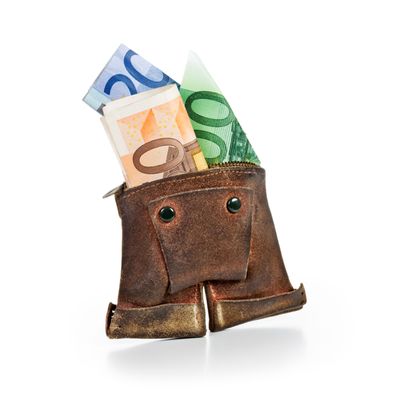
This morning, the European Central Bank took some major steps in its latest attempt to reverse years of economic problems on the continent. ECB president Mario Draghi announced that, for the first time, the ECB was cutting a key interest rate below zero, and taking other measures to ward off deflation and spur growth.
We’ve spent a lot of time in the past explaining (Part I, Part II) what’s wrong with Europe’s economy, and why it matters. So we’ll keep this brief.
What’s a negative interest rate?
It’s exactly what it sounds like: an interest rate below zero. Imagine if your bank charged you a small percentage to keep your money in a savings account, instead of paying you a small percentage. You’d probably want to get money moving out the door as quickly as possible. Europe’s banks have been doing better of late, but they’ve been hoarding their cash instead of lending it out to people and businesses who need it. Lowering the deposit rate to -.1 percent is meant to change that and get money moving again.
Will it work?
Who knows!
That’s not a very good answer.
Well, okay. The thing is that negative interest rates have been tried before, in countries like Sweden and Denmark. But in those cases, lowering the interest rate below zero didn’t do much to either help or hurt those countries’ economies. And we don’t really know what effects a negative interest rate will have on a region as large and politically fragmented as the Euro zone.
The danger of lowering interest rates for banks below zero is that, often, banks just pass those negative rates on to customers. There’s also the danger that, although Europe’s negative interest rates are directed at banks, they’ll be misunderstood as a sign of panic by the average European. If every Klaus and Katja sees headlines about negative interest rates and runs to the ATM to pull out all of their Euros, Europe could be facing a much worse problem than deflation — namely, a bank run.
Like the one in It’s a Wonderful Life?
Yep, exactly. But the good news is that a bank run is not very likely to happen. If you’re a middle-class European already getting zero interest on your savings account, paying a few cents a month isn’t much worse.
So, if cutting interest rates below zero could stimulate Europe’s economy without causing a mass panic, why didn’t the U.S. do it in 2008 and 2009?
Because we decided to do quantitative easing instead. Since the financial crisis of 2008, the U.S. Federal Reserve has been buying up bonds from banks and other institutions in an attempt to take the ankle weights off those companies and get money free-flowing again. Because it represents such a messy political union, the ECB can’t do QE in the same way we did. So it’s going to the next-best thing.
What else did Draghi announce?
The ECB is also lowering two other interest rates, and starting something known as “targeted longer term refinancing operations, or TLTROs.”
TLTROs? Are you freaking kidding me?
I know. It’s basically a fancy way of saying that the ECB is going to create a mechanism to reward banks for lending out their money instead of sitting on it.
Five-letter acronyms are why I hate economics.
That’s fair.
Anyway, how are people reacting to the announcement?
Mostly well. European savers won’t be happy to see their interest rates fall yet again. But one bank economist put out a note saying “the world looks to be a safer place today.” And stocks are up — a sign that the market likes what it sees.
Lots of Euro-watchers think the ECB still needs to do more. They’re hoping for Draghi to unleash what CNBC calls a “bond-buying bazooka.” In other words, they want the ECB to do a version of QE, as the Fed did during the U.S. economic crisis.
Draghi isn’t ruling that out. Today at a press conference, he said that the ECB was already doing “preparatory work” to get ready for a QE-style program. “Are we finished yet?” he said. “The answer is no.”
Break this down for me: Should I cancel my tickets to Oktoberfest or not?
Probably not. The ECB’s monetary easing is meant to stop deflation — increasing prices on European goods — but it also might drive down the value of the Euro, creating a more favorable exchange rate for foreign tourists. So your German vacation might actually be a bit cheaper in the fall. (Although Oktoberfest seems to be immune to currency fluctuations — the price of attending has risen faster than German inflation since 1985.)
On the plus side, the ECB’s negative interest rate decision could actually make it a bigger party. “The lower interest rates are, the greater … is the incentive to purchase beer at this year’s Wiesn compared to the alternative of saving,” one research analyst wrote before last year’s fest.





























